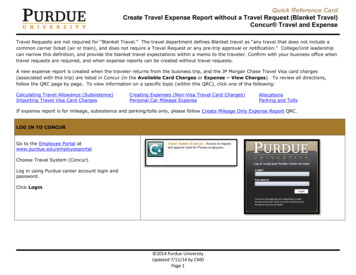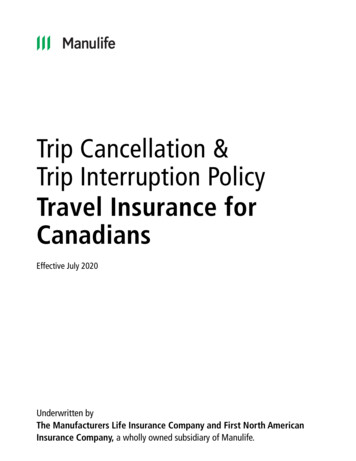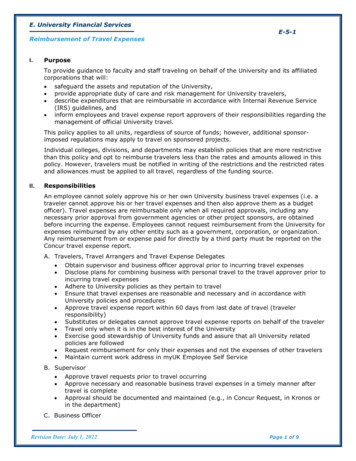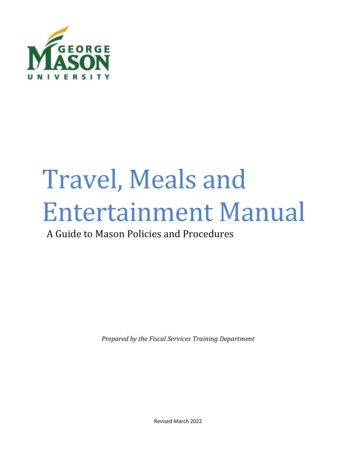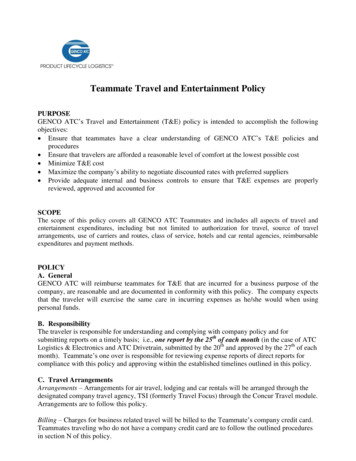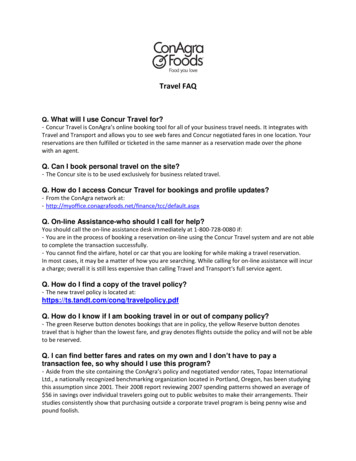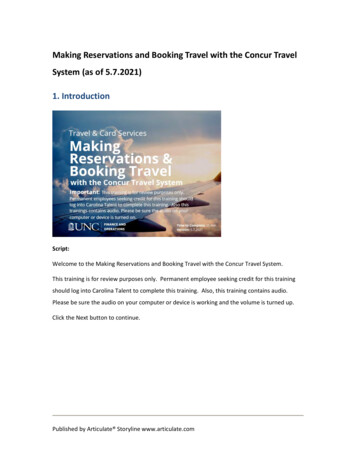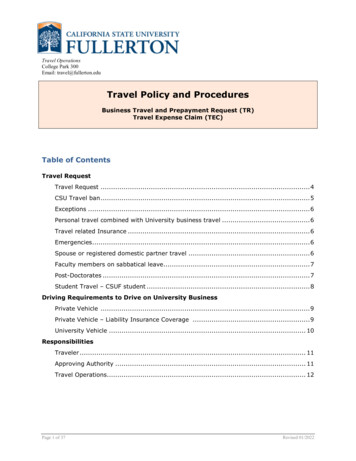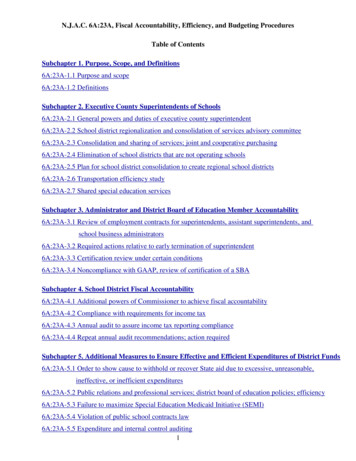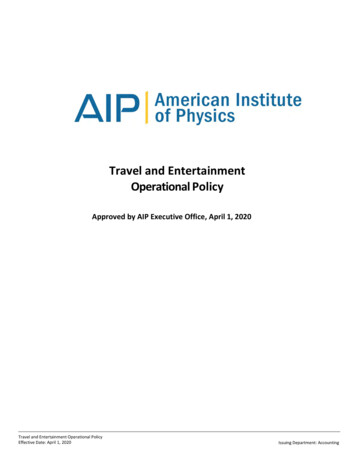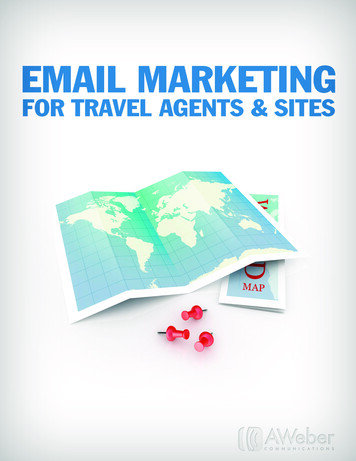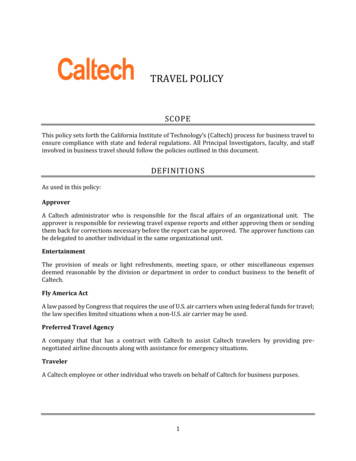
Transcription
TRAVEL POLICYSCOPEThis policy sets forth the California Institute of Technology’s (Caltech) process for business travel toensure compliance with state and federal regulations. All Principal Investigators, faculty, and staffinvolved in business travel should follow the policies outlined in this document.DEFINITIONSAs used in this policy:ApproverA Caltech administrator who is responsible for the fiscal affairs of an organizational unit. Theapprover is responsible for reviewing travel expense reports and either approving them or sendingthem back for corrections necessary before the report can be approved. The approver functions canbe delegated to another individual in the same organizational unit.EntertainmentThe provision of meals or light refreshments, meeting space, or other miscellaneous expensesdeemed reasonable by the division or department in order to conduct business to the benefit ofCaltech.Fly America ActA law passed by Congress that requires the use of U.S. air carriers when using federal funds for travel;the law specifies limited situations when a non-U.S. air carrier may be used.Preferred Travel AgencyA company that that has a contract with Caltech to assist Caltech travelers by providing prenegotiated airline discounts along with assistance for emergency situations.TravelerA Caltech employee or other individual who travels on behalf of Caltech for business purposes.1
POLICYCaltech will incur or reimburse expenses that are: 1) reasonable and necessary; 2) for Caltechbusiness purpose; and 3) documented, approved and submitted properly. This policy applies toall expenses incurred for Caltech purpose regardless of the account to which the expendituresare budgeted or recorded, the type of funding supporting such expenses, or whether incurredlocally or during Caltech travel.The Procurement Card (P-Card) is the preferred method of payment for all travel related expenses.P-Card users are encouraged to use the card to pay for all expenses related to Caltech travel exceptwhere the card is not accepted. Please refer to the P-Card policy for P-Card use and guidelines.However, Appendices A and B include lists of specific examples of common allowable andunallowable expenses. Caltech employees should review these examples before incurring travelexpenses, and should also determine if their department/division imposes any additional or morerestrictive requirements for authorizing or approving travel, entertainment or business expensereimbursements.Department travel coordinators may charge travel expenses for department travelers on one PCard provided that separate transactions are used for each traveler to facilitate expensereporting and audit requirements.Any exceptions to this policy may need to be approved in advance by the appropriate DivisionAdministrator or Department head with concurrence from the Travel Department.Areas Requiring Special ConsiderationTravel on Sponsored ResearchSince a significant portion of travel at Caltech is funded from external sources, primarily federalgrants, Caltech has elected to use approved federal standards, including those of the Internal RevenueService and the Office of Management and Budget, as a practical guide for its travelers. Beforeincurring expenses that may be charged to sponsored projects, review the general sponsored projecttravel expense requirements and limitations set forth on the Office of Sponsored Research (OSR)website and consult the appropriate Sponsored Project Administrator.Reimbursement of Travel Expenses for Nonresident AliensPayments, including but not limited to gifts, honoraria, meals, entertainment and travel expenses, tononresident aliens require special oversight. Before incurring any expenses that involve payments tononresident aliens, Caltech employees should review the Vendor & Supplier Guide for IRS & FTBWithholding Guidelines for Foreign Payees by calling (626) 395-2674 or 138-taxreportingandwithholding foreignpayees.pdfFly America ActPer 49 USC 40118, known as the “Fly America Act”, issued January 1975, U.S. flag air carriers mustbe used for travel under federal funds.The Act requires use of a U.S. flag carrier when: 1) the travel is paid for by federal funds; and 2a) aU.S. carrier is available for travel between the U.S. and a place outside the U.S.; or 2b) a U.S. carrier isreasonably available for travel between two places outside the U.S.2
Some foreign air carriers have entered into agreements granting the right to U.S. carriers topurchase and sell blocks of tickets on a foreign carrier. These agreements are termed Code Sharingand comply with the Fly America Act, provided that the ticket, boarding pass, or receipt shows thetwo-letter designator code of the U.S. Airline in the area next to the flight number. Please visit statedepartment link on code shares:https://www.gsa.gov/cdnstatic/FY18 Domestic and Intl Code Share List.pdfExceptions to the Fly America ActA) The Fly America Act describes specific situations where a non-U.S. carrier may be used because aU.S. carrier would be considered unavailable, for example: The use of a U.S. carrier would extend travel time (including delay at origin) by 24 hours ormore. The costs of transportation are reimbursed in full by a third party, such as a foreigngovernment, or an international agency. U.S. carriers do not offer nonstop or direct service between origin and destination (in whichcase a U.S. carrier must be used on each portion of the route where service is provided,unless such action increases the number of aircraft changes by two or more, extends traveltime by six hours or more, or requires a connecting time of four hours or more at anoverseas connecting point).A complete description of availability and unavailability of U.S.-flag carrier service can be foundat 48 CFR 47.403-1 (https://www.acquisition.gov/far/html/Subpart%2047 4.html).The Fly America Act clearly states that a lower fare does not justify use of a foreign air carrier, nordo convenience or preference of the traveler. Rather, only the exceptions described in the Actconstitute justified use of a foreign carrier when using federal funds.Note that no individual at Caltech or within the federal government has the authority to approveexceptions to the Act. Travel on non-U.S. airlines may be charged to federal funds only underconditions stated within the Act.B) Open Skies - The Fly America Act allows for air transportation agreements between the U.S. andother countries to constitute exceptions to the Act; these are known as “Open Skies Agreements”.There are currently 4 Open Skies Agreements recognized by the Department of Transportation asqualifying under the Act; they are with the European Union (including Iceland and Norway),Australia, Switzerland and JapanUnder Open Skies Agreements, a traveler may use an airline of a member country for travelbetween the U.S. and a member country provided there is no fare negotiated between the U.S.government and a U.S. flag carrier; this is known as a “City Pair” fare. If a City Pair fare existsbetween two cities, then the traveler must follow the Fly America Act and only the exceptionsdescribed in A) above are available (however, see below regarding changes to the U.S.-EUAgreement). To determine whether a City Pair fare exists, please go to the following website:https://cpsearch.fas.gsa.gov/Subsequent to its initial implementation, the U.S.-EU Open Skies Agreement was modified to addIceland and Norway to the list of member countries, and an exception to the City Pair farerequirement was included. Specifically, if a traveler is ineligible to use City Pair fares, the travelermay use an airline of a member country for travel under the U.S.-EU Agreement withoutconsideration of whether a City Pair fare exists (JPL campus employees are eligible for City Pair3
fares, Caltech campus employees are not).Note that Open Skies Agreements do not apply to DoD funds (e.g., Army, Navy, Air Force), thereforeall travel under DoD funds must follow the basic Fly America Act and only the exceptions describedunder A) above are applicable.CertificationAny time travel on a non-U.S. airline is charged to federal funds, a justification citing an allowableexception is required. The traveler is required to sign Caltech’s Fly America Act (49 USC 40118)Exemption Certification (Waiver Form). If an allowable exception is unavailable, the cost may notbe charged to federal funds.Expense TypesIn such cases, the charge should be to non-federal funds and the expenditure type “Travel Foreign– Unallocable” is used.When non-Fly America Act compliant travel is charged to other funding sources, the costs areexpensed to the expenditure type “Travel Foreign – Unallocable”. Using “unallocable” for all nonFly America Act compliant travel ensures that such costs are not included in the calculation ofCaltech’s Facilities & Administrative (F&A) rate.“Travel-Non US Carrier” is used for unallowable airfares according to the federal guidelines, butshould be used for airfares that are allowed by non-federal sponsors. This e-type should be usedwhen, 1) the airfare did not comply with Fly America Act or country was not under the Open SkiesAgreement, and 2) airfare to be charged to a non-federal sponsored account. For more informationrelated to coding airfares please visit s/582e-type faqs.pdfPlease refer to Appendix C Use of Foreign-Flag Air Carriers on Travel.TaxabilityCaltech’s travel expense reimbursement program meets the Internal Revenue Service (IRS)Publication 463 definition of an accountable plan. As a result, expenses and reimbursements thatconform to this policy are not reported as taxable income to the individual.Under the accountable plan, travel advances and reimbursement of expenses must meet threerequirements: Advances and reimbursements must be made for business expenses only and must bereasonably related to the expenses the employer is expected to incur.Travelers must provide an expense report substantiating the amount, dates, use, andbusiness purpose of expenses within a reasonable time (NOT TO EXCEED 30 DAYS) afterthe expenses are incurred. Receipts must be attached to the expense report.Employees must return any advance amounts in excess of substantiated expenses within30 days after completion of the trip. Employees who are cardholders not submitting anexpense report in a timely manner may experience some or all of the following actions:o Notice to approvero Retrainingo 30-day suspension of P-Card4
oP-Card revocationExpenses which may be tax reportable may not be processed on a travel report, for example,medical insurance, tuition etc. For taxability related questions, please e-mailsuppliermgmtstaff@ad.caltech.eduFrequent Flyer ProgramIt is recommended that all Caltech travel is paid for using a Caltech issued credit card i.e., P-Card.However, if a traveler chooses to use personal funds, he/she may personally retain the rewards forfrequent flyer plans or other bonuses that may accrue from business travel. However, in no casemay the traveler choose a reservation at a higher cost in order to accumulate additional plancredits. Caltech will not purchase frequent flyer miles from travelers or reimburse them for ticketsor upgrades purchased with frequent flyer miles. A free upgrade due to the application of frequentflyer miles must be noted on the expense report filed for the respective trip to demonstrate thatCaltech did not pay for the upgrade.EntertainmentEntertainment is NOT reimbursable on Federal Projects.Caltech will reimburse entertainment expenses incurred in connection with Caltech business, ifcharged to any non-federal project (unless prohibited by sponsor), that are appropriatelydocumented by the employee. Entertainment expenses include costs for meals, amusement,diversion or social activities, including outings to night clubs, theaters, or sporting events, when abusiness discussion takes place during, immediately before, or immediately after the event.It is imperative that these and any related alcohol costs be segregated using the Expenditure Type"Entertainment", so that they may be easily identified on the accounting records and excluded fromany calculation of direct or indirect costs.Documentation must include: Date of the entertainmentNames of all individualsBusiness purpose or the business benefit gained or expected to be gainedGenerally cannot request reimbursement for the cost of entertainment for their spouse or for thespouse of a customer. However, you may claim these costs if you can show that you had a clearbusiness purpose, rather than a personal or social purpose, for providing the entertainment.Example: IRS Publication 463, Chapter 2, Associated TestYou entertain a prospective new hire. The cost is an ordinary and necessary business expenseand is allowed under the entertainment rules. The candidate’s spouse joins you because it isimpractical to entertain the prospect without the spouse. You can deduct the cost of thecandidate’s spouse as an ordinary and necessary business expense. If your spouse joins theparty because the candidate’s spouse is present, the cost of the entertainment for your spouseis also an ordinary and necessary business expense.5
Personal Travel ComponentAt times a traveler may wish to combine personal activity in conjunction with a business trip.Caltech accommodates such activity provided that the related time and expenses are those of theindividual, and the business objective for the travel is unaffected.In submitting a trip’s expense report, the traveler is responsible for identifying any activity of apersonal nature that was included. The traveler should note the incremental costs resulting frompersonal activity and adjust for these costs accordingly.Incremental costs are not always clear. A Saturday night stay over, for example, can result in airfaresavings rather than add to a trip’s cost. This savings can offset the additional lodging and mealexpenses incurred. However, reimbursement of personal expenses is limited to those costs thatwould normally be reimbursed under business travel (e.g., lodging, meals, transportation) as longas the aggregate does not exceed the savings incurred by extending the original business travelincrement. Please consult with the Travel Department on specific questions.Spouse or Other Dependent ExpenseExpenses incurred for accompanying spouse, family, or others are considered personal in nature,except on the infrequent occasions when attendance of a spouse at an event furthers the businessinterests of Caltech. In these cases, the Division Administrator or Vice President for Business andFinance should authorize the spouse’s travel in writing in advance. This written approval must besubmitted with the Travel Expense Report or Payment Request Form and must document thebusiness purpose served by the spouse's attendance at the meeting or function.IRS Publication 535 requires that amounts paid by an employer for spousal travel expenses areincluded in the employee's W-2 as taxable wages unless the spouse's presence on the trip serves abona fide business purpose. Departments should consult Caltech Accounts Payable Manager –Supplier, Tax & Small Business Liaison prior to making commitments to reimburse for spousal travel,as the reimbursement may be taxable to the employee.Guidance and Requirements Pertaining to Specific Types of ExpensesUse of CardQuestCardQuest is Caltech’s online travel and expense system from Concur Technologies Incorporated.Caltech recommends use of the travel booking portal within CardQuest to assist with air, rail, hotel,and car rental arrangements. Information regarding the travel booking portal and policies for makingarrangements are available on the Procurement Department’s Travel website.PrepaymentsPrepayments to a supplier can be requested to cover such items as program registration and airfareticketing. If the supplier accepts credit cards, P-Card should be used. A traveler without a P-Cardshould pursue prepayment through a division/department travel arranger’s P-Card. Prepaymentsthat are included on the Payment Request usage list may be submitted using a Payment Request Formif the supplier does not accept P-Card or a travel arranger’s P-Card is not available for use. ThePayment Request form and usage list are available at:https://procurement.caltech.edu/forms.6
Cash AdvancesCash advances can only be obtained to cover official business expenses and as a rule are provided toCaltech employees and students only. Cash advances are used for meals, tips, taxis, and otherincidental out of pocket expenses where a P-Card is not an available payment option. Cash Advancescan be acquired using two methods:1. ATM cash withdrawal (made by Cardholders only): Cash cannot be withdrawn for anothertraveler. With approval, a traveler with a P-Card may have a cash advance feature availableon their card. To add this feature, please contact P-Card Services. Caltech will accept thecash advance fees assessed as a reasonable trip expense. Individuals that do not abide bythese rules may have the cash option removed from their profile.2. Per Diem request issued in CardQuest via a Per Diem (expense type):3. -Advances must be requested by travelers (or their delegates), approved and routed toP-Card team for final approval and processing. A report for per diem (only) can be createdin CardQuest and submitted before a trip takes place. Advances will be issued as a checkmade payable to the traveler via mail or Direct Deposit.If any cash advance has not been accounted for within 30 days after the traveler has returned,Caltech may report the outstanding balance of any travel advance on his or her IRS Form W-2(Wage and Tax Statement). No additional cash advances will be granted if there are outstandingadvances in excess of 30 days, unless there is approval by a responsible Campus official above thereporting level of the traveler.Allowable Advance of meals and incidentals per diem, and local transportation (taxis, shuttles, etc.) Payment to suppliers when the P-Card is not an accepted form of payment(conference registrations, some lodging)NOT Allowable Payment to traveler for any reimbursements Payment to suppliers who do accept P-Card as form of paymentAir TravelThe preferred method for making a reservation for air travel is through the travel booking portalwithin CardQuest.The Uniform Guidance (2 CFR 200, Subpart E Cost Principles and § 200.474 Travel Costs) prohibitsthe charging of business or first class air travel to sponsored projects. When any travel relates to aFederal account (relating to the United States government and its agencies), the excess in cost overthe coach fare must be charged to a non-sponsored account. It is imperative that the excess costsbe segregated by using the Expenditure Type, “Travel-domestic-Unallocable” or “Travel-foreignUnallocable,” as applicable, so that they may be easily identified on the accounting records andexcluded from Caltech’s F&A rate calculation.DomesticCaltech allows economy and coach classes for domestic air travel. Air travel should be purchasedat the lowest available standard coach/economy airfare. Economy Plus purchases or upgrades areunallowable on federal funded projects, except under very specific conditions. If an upgrade is7
purchased, the difference of the upgrade is to be charged to a non-federal account.FAR (Federal Acquisition Regulation) 31.205-46, as it pertains to travel costs, states that airfarecosts in excess of the lowest customary standard, coach, or equivalent priced airfare offered to thecontractor during normal business hours are unallowable except when such accommodationsrequire circuitous routing, require travel during unreasonable hours, excessively prolong travel,result in increased cost that would offset transportation savings, are not reasonably adequate forthe physical or medical needs of the traveler, or are not reasonably available to meet missionrequirements. However, in order for airfare costs in excess of the above standard airfare to beallowable, the applicable condition(s) set forth above must be documented and justified.Business and first class travel may be allowed only if charged to any non-federal project (unlessprohibited by sponsor). Business and first class airfare must use the Expenditure Type “TravelDomestic-Unallocable.” Exceptions for business and first class travel require a written justificationapproved by a responsible campus official above the reporting level of the traveler. Business andfirst class are NOT allowed on federal funded projects, except under extremely rare conditions andrequire prior approval.ForeignCaltech allows business class for foreign travel if charged to any non-federal project (unlessprohibited by sponsor). First class travel may be allowed with written justification approved by aresponsible campus official above the reporting level of the traveler. Business and first class airfaremust use the Expenditure Type “Travel Foreign-Unallocable.”Business and first class are NOT allowed on federal funded projects, except under very specificconditions.ExceptionsExceptions to airfare class are accepted, if flight scheduling otherwise available would Require travel during unreasonable hours Excessively prolong travel Greatly increase the duration of the flight Not reasonably accommodate a traveler’s medical needsGround TravelPublicly available ground transportation such as shuttles, buses, and vans (including Caltech shuttletransport), taxis, car services, rail and public transit systems should be considered as a timely and costefficient means of transportation, and used as an option to commercial car rental when appropriate.Car Rentals and AutomobilesThe preferred method for making a reservation for car rentals is through the travel booking portalwithin CardQuestRental vehicles are appropriate to meet the business needs of a trip as a cost or time effectivealternative to publicly available ground transportation. In general, a compact or midsize vehicleis authorized except where three or more travelers are involved, in which case a full-size vehicleis authorized.8
Travelers who deliberately abuse rental cars, through actions such as off-roading of vehicles andnegligent or illegal activity may be held responsible for damages.Car Rental and Automobile InsuranceTravelers are encouraged to use Caltech preferred car rental company and reference the agreementnumber found on the Car Rental Agreement website. Using a preferred car rental company affordsprimary liability and comprehensive/collision (CDW/LDW) coverage at no cost to Caltech.Caltech’s insurance covers the vehicle rented for business purposes for domestic travel on anexcess basis.Travelers are required to cite Caltech agreement number when making a reservation, and beprepared to provide a Driver’s License and Caltech identification at vehicle pickup. Theseagreements are limited to faculty, staff, students (over 21 years), and volunteers registered throughHuman Resources traveling on Caltech business. Caltech consultants and contractors must rentindependently to avoid implied department or Caltech liability.When using a preferred car rental company: Travelers should decline any optional insurance coverage offered; and The cost of optional insurance coverage taken is not a reimbursable travel expense.When using a non-preferred rental car company, travelers are required to: Provide an explanation on the expense report stating the business reason a nonpreferred rental car company was used; Accept insurance coverage for liability and comprehensive/collision damage (LDW); Decline any other coverage for personal effects in the car (PAI). Excess coverage such asPAI is not a reimbursable travel expense; and When using rental car companies for business purposes, travelers are required to add alldrivers to the insurance.Foreign Rental VehiclesOn Caltech business, only established, well known car rentals companies should be used. Driversshould be familiar with prevailing license and driving rules in electing to rent a vehicle.If not automatically included, the traveler should accept optional liability and CDW/LDW insurancecoverage at the minimum limits offered. The cost of this coverage is a reimbursable travel expense.Theft Protection on foreign rentals will only be reimbursed if it is mandated by the country.Personal VehiclesTravelers may use a privately owned vehicle (POV) for local business transportation where it istime and cost effective when compared to publicly available ground transportation. Travelers maynot use their POV to transport or deliver any equipment. Reimbursement is provided at theprevailing IRS standard mileage rate, which can be found chasinghome/mileageratesThis reimbursement applies to the cost of fuel, maintenance, and insurance. Parking charges andtolls are reimbursable. A POV can be used in instances where scheduled rail or airline service is nota practical option or where use of a POV is approved by the traveler’s department. Reimbursementmay not exceed the cost of economy airfare and reasonable ground transportation otherwiseavailable.9
Mileage to and from an individual’s regular place of work and residence is not reimbursable. Roundtrip mileage is reimbursable to an airport, for example, where a traveler drives him/herself or isdelivered or picked up by a family member in connection with business travel, as this offsets thecost of ground transportation charges otherwise incurred.Caltech does not provide automobile liability and comprehensive/collision insurance protectionfor loss or damage to a privately owned vehicle used for business travel. It is the responsibility ofa traveler using a privately owned vehicle to carry adequate insurance coverage as required byCalifornia Vehicle Code Section 16020, which requires that every driver and every owner shall atall times be able to establish financial responsibility and shall at all times carry in the vehicleevidence of the form of financial responsibility in effect for the vehicle. When driving a privatelyowned vehicle on Caltech business, the individual’s insurance coverage for that vehicle is primaryin the case of damage to property and/or injury to persons.AccidentsCaltech employees involved in an accident while driving on official Caltech business must reportthe accident immediately to the local police department, and notify the rental car companyimmediately.Passenger vans, van rentals and charter busesUse and/or rental of 12 and 15 passenger vans driven by a Caltech employee for Caltech business isprohibited. An insured, third-party chauffeur service provider must be used. Rentals of buses forgroup events and chauffeur services must have a Purchase Order. Van rentals, for the purpose oftransportation of equipment, are prohibited; such expenses need to be arranged with a bondedtransport company.LodgingThe preferred method for making a reservation for hotel rooms is through the travel booking portalwithin CardQuest.Lodging is reimbursed based on the actual cost of the lodging. Where lodging is not hosted,accommodations in a standard hotel room are authorized. Travelers are encouraged to utilize Caltechpreferred Travel Agency to avail themselves of any pre-negotiated lodging discounts. Reservations areoften guaranteed to assure lodging for late arrivals, and travelers are required to cancel reservationsin a timely manner to prevent “no show” charges. An itemized receipt for charges must accompanyany request for reimbursement of expenses.For taxability reasons ‘long term rentals’ to third parties cannot be processed on a PaymentRequest; they must be processed on a Purchase Order.In order to avoid tax implications, travelers who are staying in a private residence should seekprepayment through Purchasing rather than paying the private residence directly.Hosted LodgingOn occasion, a non-federal sponsor, colleague or relative may host a traveler. In these instances,the traveler may compensate the host with a gift as appropriate, provided that the cost of such giftis within sponsor guidelines. Under IRS regulations, a receipt must be submitted for any such giftover 25. Only one gift per stay may be provided. In no circumstances may cash payment be madeto the host for lodging.10
Meal ExpensesMeal and incidental expenses (M&IE) are reported using either actual expenses or per diem. A travelermay not be reimbursed both actual expense and per diem during a single trip.Terms are defined as: Meals - expenses for breakfast, lunch, dinner and related tips and taxes; Incidental expenses - fees and tips given to porters, baggage carriers, bellhops,hotel maids, stewards, etc.; Actual expenses - payment of authorized actual expenses incurred; and Per diem – a daily payment in lieu of reimbursement for actual expenses.Per DiemFor a trip to qualify for per diem, a trip must have an overnight stay. Day of departure and last dayof trip per diem amounts are calculated utilizing a clock with the applicable M&IE rate.If meals are provided as part of the registration for a conference, Federal Travel Regulation (FTR)requires the traveler to deduct those meals from their per diem. These adjustments can be madein CardQuest via Travel Allowance Expense and Adjustments tab. The per diem webpage provideslinks to the daily per diem rates and appropriate deductions that are applicable to all ContinentalUS destinations. To view which rate applies to the city or cities included in a trip purchasinghome/perdiem.To view M&IE per diem adjustments if breakfast, lunch and dinner is provided please visit theMeals and Incidental Expenses (M&IE) Breakdown chart on the following t
restrictive requirements for authorizing or approving travel, entertainment or business expense reimbursements. Department travel coordinators may charge travel expenses for department travelers on one P-Card provided that separate transactions are used for each traveler to facilitate expense reporting and audit requirements.
